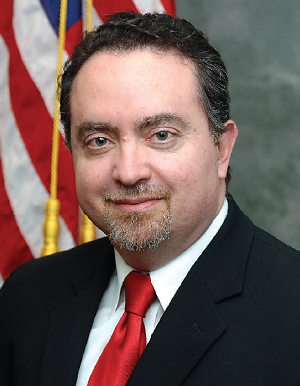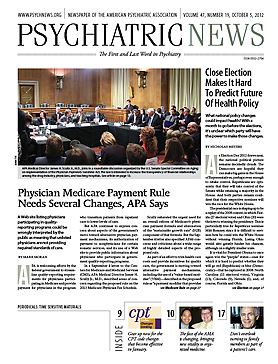Paolo del Vecchio, M.S.W., named director of the federal Center for Mental Health Services (CMHS) in July, has seen the world of mental health services from every possible perspective.
CMHS is part of the Substance Abuse and Mental Health Services Administration (SAMHSA). Its task is to help states improve access to and quality of “treatment, rehabilitation, and support services for people with mental illness, their families, and communities.”
Del Vecchio discussed his experience and his vision for the agency in a recent interview with Psychiatric News.
He came to work at SAMHSA in 1995 as its first consumer-affairs specialist and worked to increase the involvement of mental health care consumers in the provision of services and in public education about mental illness.
“I’m proud of two things that we have accomplished here,” said del Vecchio. “A national action plan to reduce seclusion and restraint and a unified definition of recovery covering both mental health and addictions.”
After earning his M.S.W. from Temple University, del Vecchio worked for seven years at a public mental health center helping patients discharged from state hospitals. He then developed policy and planning for the city of Philadelphia—working on AIDS issues, homelessness, and community integration of institutionalized people.
CMHS uses its grants program to expand outreach and test innovations. For instance, certain community mental health services block grants go to states that use the funds to support recovery services not financed by Medicaid or other existing programs, he said.
The agency also looks at ways to develop trauma-informed care, since many people with psychiatric disorders, including addiction, have experienced childhood abuse or witnessed violence, and trauma is often a precursor to mental disorders.
Also, since most mental disorders begin early in life, early interventions could lead to less disability and distress in the long run, he emphasized. “We want to look upstream to prevent trauma in the first place as a means to prevent behavioral health disorders from the start.”
Agency Funds Innovative Programs
CMHS also is using grants to test approaches connecting primary care to community mental health settings, in order to address the high somatic comorbidity and early mortality of people with serious mental illness, he said.
“This is a public-health crisis, and we have a medical and moral imperative to address it,” he said. “We need to train primary care providers to better treat people with behavioral health care issues, as well as to [directly] treat those issues too.”
Psychiatry plays a key role in that process by bringing its specialized knowledge into primary health care settings and providing expert psychiatric consultations, he noted.
Another potential place for psychiatry lies in its connection with other medical specialties, like cardiology or endocrinology, where better mental health can improve somatic outcomes.
CMHS’s Recovery to Practice initiative includes APA and the professional associations of psychologists, social workers, drug and alcohol counselors, and peer specialists. “We are collaborating on developing training materials to upgrade their members on recovery-based approaches,” said del Vecchio.
Personal Experience Shaped His Interest
Del Vecchio’s professional experience is informed by a personal one as well. He is both a provider and a consumer of mental health services, he said.
“My experience as a mental health service recipient goes back to when I was in the third grade, when I was taken out of the classroom and told that I had to speak to the school psychologist,” he recalled. “And 40-plus years later, what still sticks with me was the reaction of my classmates: the social exclusion I experienced, the derision.”
That stigma pushed him away from seeking services for 20 years, even as he was bullied up through high school.
“I turned to drugs and alcohol to deal with this trauma, and it came to a head in my college years, as it does for many of us,” he said. “I found myself on a subway platform in north Philadelphia, ready to make that step. What pulled me back was the thought of the impact that this would have on my family. I went to the local school-counseling center, and they told me to come back in a month—they’d have an appointment for me then.”
Coincidentally, he found a job listing in the same office for a telephone hotline operator.
“I took it and found out I wasn’t alone,” he said. “There were many other people experiencing what I was. I also realized that by helping others, we help ourselves. So I dedicated myself and my career to mental health issues.”


